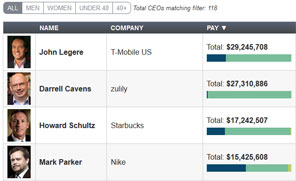Originally published June 21, 2014 at 6:51 PM | Page modified June 21, 2014 at 6:52 PM
Kidnap risk for Brazil CEOs used to defend pay secrecy
More than a third of Brazil’s most-traded companies are refusing to release pay data as a court case against the decision plays out.
Bloomberg News
Pulling away: 5 highest-paid CEOs
Stock benefits separated the highest-paid executives of Northwest public companies from the rest.

1John Legere, T-Mobile US
2Darrell Cavens, zulily
3Howard Schultz, Starbucks
4Mark Parker,
Nike
5Spencer Rascoff, Zillow
1John Legere — T-Mobile US
2013 total pay: $29.2 million
Cash pay: $6.6 million
Equity pay: $22.5 million
Market cap (12/31): $29.97 billion
Profit FY 2013: $35 million
Number of employees: 40,000
2Darrell Cavens — zulily
2013 total pay: $27.3 million
Cash pay: $350,000
Equity pay: $26.9 million
Market cap (12/31): $5.13 billion
Profit FY 2013: $12.9 million
Number of employees: 1,110
3Howard Schultz — Starbucks
2013 total pay: $17.2 million
Cash pay: $3.7 million
Equity pay: $13.3 million
Market cap (12/31): $59 billion
Profit FY 2013: $8.3 million
Number of employees: 182,000
4Mark Parker — Nike
2013 total pay: $15.4 million
Cash pay: $7.1 million
Equity pay: $7.7 million
Market cap (12/31): $69.3 billion
Profit FY 2013: $2.5 billion
Number of employees: 48,000
5Spencer Rascoff — Zillow
2013 total pay: $10.6 million
Cash pay: $473.570
Equity pay: $10.1 million
Market cap (12/31): $3.2 billion
Loss FY 2013: $12.5 million
Number of employees: 817
Source: Equilar and SEC documents
Illustration: David Miller / The Seattle Times
More
![]()
Brazilian chief executives are fighting to keep their salaries secret.
Companies from Embraer to Itau Unibanco Holding to Vale, all with American depositary receipts, don’t disclose compensation for top officials, contrary to international norms in countries like the U.S. and U.K. Four years after securities regulator CVM ordered release of expanded pay details, more than a third of Brazil’s most-traded companies are refusing to do so as a court case against the decision plays out.
Shareholders say the information ensures CEOs don’t overpay themselves to the detriment of investors, while corporations say the rule violates managers’ privacy and puts them at risk for kidnapping. They cite the case of Abilio Diniz, who was held hostage for several days in 1989 when he was an executive at supermarket chain Cia Brasileira de Distribuicao Grupo Pao de Acucar, and the escape of three children of billionaire Jorge Paulo Lemann from an attempted abduction in 1999.
“In Brazil, if you say how much you make, you’re an idiot, irresponsible or an exhibitionist,” said José Roberto de Castro Neves, the lawyer who filed an injunction in 2010 against the CVM decision on behalf of the Brazilian Institute of Finance Executives in Rio de Janeiro. “Some executives have had to change their lives. In the suburbs of the U.S., they don’t even have walls around their homes. Here in Brazil, we live in bulletproof cars, in another environment.”
His firm — Ferro, Castro Neves, Daltro & Gomide — went to court to argue that companies should withhold salary information. The case remains under litigation in a Rio de Janeiro federal court.
The lack of salary data at Sao Jose dos Campos-based Embraer prompted advisory firm Institutional Shareholder Services to urge investors in a meeting tomorrow to reject $29.4 million in pay for executives and directors at the largest maker of regional jets.
“As evolved and as sophisticated as some of the criminal groups might be in Brazil, I seriously doubt that kidnappers are reading proxy statements,” said Cristiano Guerra, ISS’s head of Latin America and U.S. research. For minority investors, “remuneration is the next hot topic that they’ll start pressuring companies for.”
While many companies like Embraer release combined pay for executives and boards, they object to the 2010 rule requiring corporations to also report the highest, average and lowest salary figures for those officials. Individual wages, stock benefits and long-term incentives don’t have to be disclosed.
Under U.S. Securities and Exchange Commission regulations, companies must show compensation paid to CEOs, chief financial officers and other senior executives in a “clear, concise and understandable” way, including the amount, type and criteria used in determining pay.
The Brazilian rule change was prompted by long-running fights in the U.S. over executive pay in the midst of the 2008 financial crisis, said Castro Neves. In Brazil, “we didn’t have such big distortions.”
“You can’t import everything — you have to look at our realities,” Castro Neves said in a telephone interview.
Embraer declined to comment about its pay policies, as did Vale, the world’s biggest iron-ore producer, and Itau, Latin America’s largest bank by market value.
When asked about the dispute, the CVM cited its arguments in a case it won against linens maker Teka-Tecelagem Kuehnrich SA in which the regulator said divulging salaries is aligned with international regulations and provides transparency and credibility. Teka didn’t return an email request for comment.
While kidnappings still rank as a concern for affluent Brazilians, incidents have plunged in recent years. In São Paulo state, Brazil’s richest with a third of gross domestic product, nine people were abducted in 2013’s fourth quarter, according to the state’s security department. That compares with 127 people in the same period of 2001.
 Four weeks for 99 cents of unlimited digital access to The Seattle Times. Try it now!
Four weeks for 99 cents of unlimited digital access to The Seattle Times. Try it now!
















